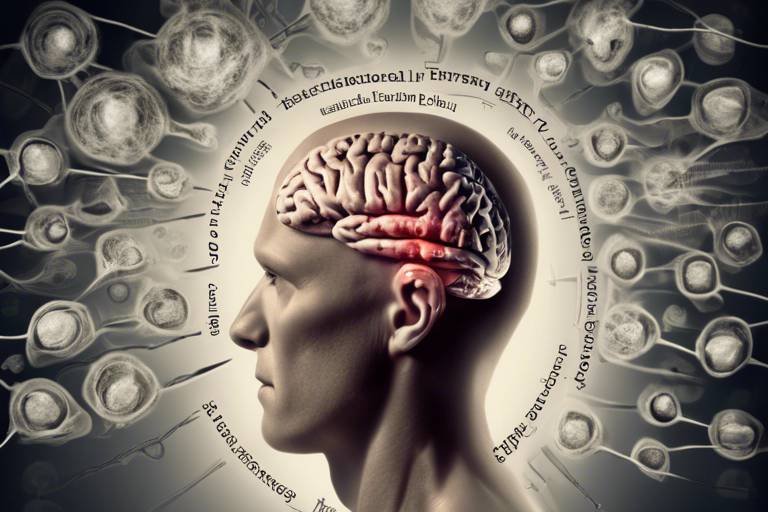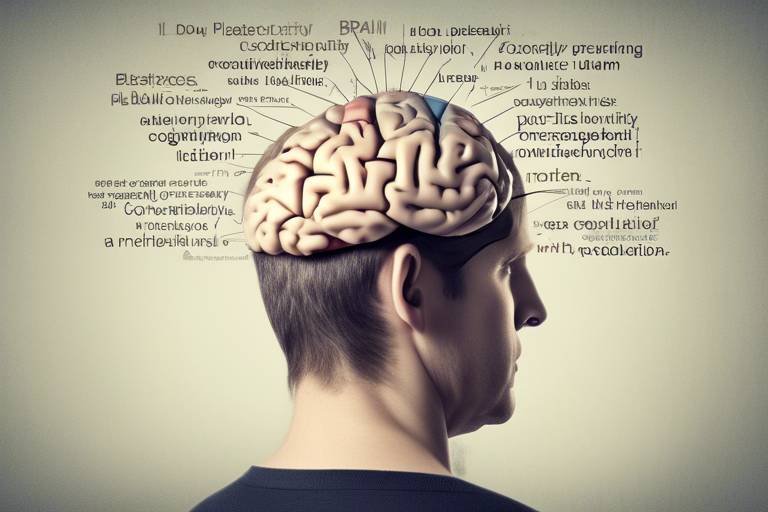A Holistic Approach to Health - The Philosophy of Life Sciences
In today's fast-paced world, the quest for health often feels like a never-ending journey. We find ourselves juggling various aspects of our lives, from work to family, and sometimes, our health takes a backseat. But what if I told you that achieving optimal health is not just about physical fitness or eating the right foods? It's about embracing a holistic approach that considers the intricate connections between our physical, mental, and spiritual well-being. This philosophy of life sciences encourages us to look beyond isolated symptoms and understand the interconnectedness of our entire being.
Imagine your health as a beautiful tapestry, woven with threads of various colors and textures. Each thread represents a different aspect of your life—nutrition, exercise, mental health, and spirituality. If one thread is frayed or missing, the entire tapestry can lose its beauty and strength. This is the essence of holistic health: recognizing that every element of our lives contributes to our overall wellness.
So, how do we begin to embrace this holistic philosophy? It starts with understanding the fundamental principles that guide this approach. Holistic health is rooted in the belief that we are not just physical bodies; we are complex beings with emotions, thoughts, and spiritual dimensions. By nurturing each aspect of ourselves, we can achieve a state of harmony and balance that promotes true well-being.
As we delve deeper into this article, we'll explore the pivotal role of nutrition, the impact of exercise, and the significance of mental and emotional health. We'll also examine how spiritual practices can enrich our journey towards holistic wellness. By the end, you'll have a comprehensive understanding of how to integrate these elements into your life, paving the way for a healthier, more fulfilling existence.
Understanding the fundamental principles of holistic health is essential for achieving balance and harmony in life. This section delves into the core beliefs that underpin this comprehensive approach to wellness. At its core, holistic health emphasizes the importance of treating the whole person rather than just addressing specific symptoms. This means recognizing that our physical health is deeply intertwined with our emotional and spiritual well-being.
Moreover, holistic health encourages us to take an active role in our own wellness journey. It's about empowerment—understanding that we have the ability to influence our health through our choices and lifestyle. This proactive approach fosters a sense of responsibility, allowing us to make informed decisions that align with our personal values and goals.
Incorporating holistic practices into your daily routine can be as simple as:
- Choosing whole, nutrient-dense foods over processed options
- Engaging in regular physical activity that you enjoy
- Practicing mindfulness and meditation to cultivate mental clarity
- Building supportive social connections that nourish your emotional health
By embracing these principles, you can create a solid foundation for your holistic health journey. Remember, it's not about perfection; it's about progress and finding what works best for you.
Nutrition plays a vital role in holistic health. The foods we consume are not just fuel; they are the building blocks of our physical and mental well-being. A balanced diet rich in whole foods can significantly influence our mood, energy levels, and overall health. But what exactly does a balanced diet look like? It’s about more than just counting calories; it’s about nourishing your body with the right nutrients.
When we talk about nutrition, one of the most important distinctions to make is between whole foods and processed foods. Whole foods are those that are minimally altered from their natural state. They are packed with essential nutrients and provide a wealth of health benefits. In contrast, processed foods often contain added sugars, unhealthy fats, and artificial ingredients that can detract from our health.
| Whole Foods | Processed Foods |
|---|---|
| Fruits and Vegetables | Canned or Frozen with Added Sugars |
| Whole Grains | Refined Grains (like white bread) |
| Nuts and Seeds | Snack Foods (like chips) |
Choosing whole foods over processed options can lead to better health outcomes and enhanced vitality. Think of it this way: would you rather fill your car with premium fuel or cheap gas? Your body deserves the best, and whole foods provide just that.
Nutrient density refers to the amount of essential nutrients per calorie in food. Focusing on nutrient-dense foods means prioritizing those that offer the most benefits without excess calories. Foods like leafy greens, berries, and lean proteins are excellent examples. By incorporating these into your meals, you can optimize your health and feel more energized throughout the day.
Mindful eating is another crucial aspect of holistic nutrition. It encourages awareness of food choices and eating habits. Instead of mindlessly snacking while watching TV, take a moment to savor each bite of your meal. Techniques such as deep breathing before meals, appreciating the flavors, and listening to your body's hunger cues can greatly improve your relationship with food. This practice not only enhances digestion but also increases satisfaction, helping you to enjoy your meals fully.
Physical activity is crucial for holistic health. Regular exercise is not just about burning calories; it has profound effects on our mental clarity, emotional stability, and overall vitality. When we engage in physical activity, our bodies release endorphins, which are natural mood lifters. Think of exercise as a magic pill that can transform your mood and energy levels.
Incorporating movement into your daily routine doesn't have to be a chore. Find activities that you genuinely enjoy—whether it's dancing, hiking, or playing sports. The key is to make it fun and engaging, so it becomes a natural part of your lifestyle.
Mental and emotional health are integral components of holistic wellness. Just as we nourish our bodies, we must also nourish our minds and spirits. Practices that support emotional resilience and mental clarity are essential in this regard. The mind-body connection is powerful; when we take care of our mental health, we often see improvements in our physical health as well.
Effective stress management is essential for maintaining mental health. Stress can take a significant toll on our bodies and minds, leading to various health issues. Techniques such as meditation, yoga, and deep breathing exercises can help alleviate stress and promote relaxation. Imagine your mind as a busy highway; when you take the time to slow down and navigate through traffic, you can reach your destination more peacefully.
Social connections significantly impact mental and emotional health. Building supportive relationships fosters a sense of belonging and enhances overall well-being. Surrounding yourself with positive influences can uplift your spirit and provide a safety net during challenging times. Remember, we are social beings, and nurturing these connections is vital for our holistic health.
Spirituality can enrich the holistic health journey. It doesn't have to be tied to a specific religion; it can simply be about finding meaning and purpose in life. Various spiritual practices, such as meditation, prayer, or spending time in nature, can promote inner peace and connection to something greater than oneself.
Meditation and mindfulness practices cultivate awareness and presence. These techniques can significantly enhance mental clarity and emotional balance. By dedicating even a few minutes each day to sit in silence and reflect, you can create a space for peace and clarity amid the chaos of daily life.
A sense of purpose is vital for holistic health. Identifying personal values and goals can lead to a more fulfilling and meaningful life. Think of it as having a compass that guides you through the ups and downs of life. When you know what truly matters to you, making decisions becomes easier, and you can navigate your journey with confidence.
Q: What is holistic health?
A: Holistic health is an approach that considers the whole person—physical, mental, and spiritual—rather than just focusing on individual symptoms or illnesses.
Q: How can I start incorporating holistic practices into my life?
A: Begin by making small changes, such as improving your diet, engaging in regular exercise, practicing mindfulness, and nurturing your relationships.
Q: Do I need to follow a specific diet for holistic health?
A: While there isn't a one-size-fits-all diet, focusing on whole, nutrient-dense foods is generally beneficial for holistic health.
Q: Can spirituality impact my physical health?
A: Yes, many studies suggest that spiritual practices can improve mental health, which in turn can have positive effects on physical health.
Q: How important are social connections for my well-being?
A: Social connections are crucial for emotional health and can significantly enhance your overall sense of well-being.

The Principles of Holistic Health
This article explores the interconnectedness of physical, mental, and spiritual health, emphasizing a holistic perspective that integrates various life sciences to promote overall well-being.
Understanding the fundamental principles of holistic health is essential for achieving balance and harmony in life. At its core, holistic health is about recognizing the intricate web of connections between our body, mind, and spirit. It’s like a well-tuned orchestra where every instrument plays a crucial role in creating a beautiful symphony. When one part is out of tune, the whole experience can be disrupted. This philosophy encourages us to look beyond just treating symptoms and instead focus on the underlying causes of our health issues.
One of the key principles of holistic health is the idea that each individual is unique. Just as no two fingerprints are alike, our health needs are different based on our genetics, lifestyle, and environment. This personalized approach means that what works for one person may not work for another. Therefore, it is vital to listen to our bodies and understand our unique needs. This can involve keeping a journal to track how different foods, activities, and emotions affect our well-being.
Another fundamental aspect of holistic health is the belief in the interconnectedness of all aspects of life. This principle suggests that our physical health, mental state, and spiritual well-being are not isolated from one another. Instead, they influence each other in profound ways. For instance, stress can manifest physically through headaches or digestive issues, while physical ailments can lead to feelings of anxiety or depression. By addressing all these facets, we can achieve a more comprehensive state of health.
Additionally, holistic health emphasizes the importance of preventative care. Rather than waiting for illness to strike, this approach encourages proactive measures to maintain health. This could include regular exercise, balanced nutrition, and mental health practices like meditation or therapy. Think of it as regularly servicing your car to ensure it runs smoothly, rather than waiting for it to break down on the highway.
Incorporating mindfulness into our daily routines is another principle of holistic health. Mindfulness encourages us to be present in the moment, fostering a deeper connection to ourselves and our surroundings. This practice can lead to greater emotional resilience and improved mental clarity. It’s like polishing a mirror; the clearer the mirror, the better we can see our reflections and the world around us.
Lastly, embracing a sense of community and connection is vital. Humans are inherently social beings, and our relationships can significantly impact our health. Being part of a supportive community can enhance our emotional well-being and provide a sense of belonging. Whether it’s friends, family, or support groups, these connections serve as a safety net during tough times.
In summary, the principles of holistic health revolve around:
- Individuality: Recognizing that each person has unique health needs.
- Interconnectedness: Understanding how physical, mental, and spiritual health influence each other.
- Preventative Care: Emphasizing proactive measures to maintain health.
- Mindfulness: Cultivating awareness of the present moment.
- Community: Valuing social connections and support.
By embracing these principles, we can navigate our health journeys with greater awareness and intention, leading to a more fulfilling and balanced life.
Q1: What is holistic health?
A holistic health approach considers the whole person—body, mind, and spirit—rather than just focusing on symptoms or specific ailments.
Q2: How can I start incorporating holistic health principles into my life?
Begin by assessing your physical, mental, and spiritual health, and consider practices such as mindfulness, balanced nutrition, and regular exercise.
Q3: Is holistic health the same as alternative medicine?
While holistic health often includes alternative medicine, it also encompasses traditional medical practices, focusing on a comprehensive approach to well-being.
Q4: Can holistic health help with stress management?
Absolutely! Holistic health emphasizes stress management techniques such as meditation, yoga, and deep breathing exercises, which can significantly improve mental well-being.

The Role of Nutrition
Nutrition is not just about filling your stomach; it's about fueling your body and mind with the right ingredients to thrive. When we talk about holistic health, nutrition takes center stage because it influences every aspect of our well-being. Think of your body as a car; if you put low-quality fuel in the tank, you can’t expect it to run smoothly. Similarly, the food we consume directly impacts our physical health, mental clarity, and emotional stability. So, how can we harness the power of nutrition to enhance our overall wellness?
A balanced diet rich in whole foods can significantly improve our quality of life. Whole foods are those that are minimally processed and free from artificial ingredients. They are packed with essential nutrients that our bodies crave. In contrast, processed foods often contain unhealthy additives, sugars, and unhealthy fats that can lead to a myriad of health issues, including obesity, diabetes, and heart disease. To illustrate this point, let’s take a closer look at the differences:
| Whole Foods | Processed Foods |
|---|---|
| Rich in nutrients | Often low in nutrients |
| Supports overall health | Can lead to health issues |
| Natural ingredients | Contains artificial additives |
| Promotes energy and vitality | Can cause energy crashes |
Moreover, the concept of nutrient density plays a crucial role in our dietary choices. Nutrient density refers to the amount of essential nutrients, such as vitamins, minerals, and antioxidants, relative to the calorie content of food. Foods that are nutrient-dense provide more health benefits per calorie, making them a smarter choice for anyone looking to optimize their health. For instance, a cup of spinach is far more nutrient-dense than a slice of cake, even if both have similar calorie counts. By focusing on nutrient-dense foods, we can maximize our intake of beneficial nutrients while minimizing empty calories.
Another vital aspect of nutrition is the practice of mindful eating. In our fast-paced lives, we often eat without thinking, leading to poor food choices and overeating. Mindful eating encourages us to slow down and pay attention to what we eat. It involves savoring each bite, recognizing hunger and fullness cues, and appreciating the flavors and textures of our food. This practice not only enhances our relationship with food but also improves digestion and satisfaction. Here are some techniques to cultivate mindfulness during meals:
- Eat without distractions, such as TV or smartphones.
- Take small bites and chew slowly.
- Reflect on where your food comes from and its journey to your plate.
- Listen to your body’s hunger signals.
In conclusion, nutrition is a cornerstone of holistic health. By prioritizing whole foods, understanding nutrient density, and practicing mindful eating, we can create a solid foundation for our physical and mental well-being. Remember, every meal is an opportunity to nourish your body and mind, so choose wisely!
Q1: What are whole foods?
Whole foods are natural, unprocessed foods that are free from additives. Examples include fruits, vegetables, whole grains, nuts, and seeds.
Q2: How does nutrition affect mental health?
Nutrition plays a significant role in mental health by influencing brain function and mood. A balanced diet can help improve cognitive function and emotional stability.
Q3: What is mindful eating?
Mindful eating is the practice of being fully present and aware of your food choices, savoring each bite, and listening to your body’s hunger and fullness cues.
Q4: How can I incorporate more whole foods into my diet?
Start by adding more fruits and vegetables to your meals, choosing whole grains instead of refined ones, and opting for natural snacks like nuts and seeds.

Whole Foods vs. Processed Foods
When it comes to our diets, the debate between whole foods and processed foods is a hot topic that often leaves many scratching their heads. What’s the real difference, and why should we care? Let’s break it down. Whole foods are essentially foods that are as close to their natural state as possible. Think of them as the unfiltered version of food—fresh fruits, vegetables, whole grains, nuts, and seeds. On the other hand, processed foods are those that have been altered from their original form, often packed with additives, preservatives, and a laundry list of ingredients that can leave you wondering what you’re actually eating.
The nutritional benefits of choosing whole foods over processed options are staggering. Whole foods are typically rich in essential nutrients, fiber, and antioxidants that are crucial for maintaining overall health. In contrast, processed foods often contain high levels of sugar, unhealthy fats, and sodium, which can lead to various health issues such as obesity, heart disease, and diabetes. To illustrate this, let’s take a look at the following comparison:
| Aspect | Whole Foods | Processed Foods |
|---|---|---|
| Nutritional Content | High in nutrients, fiber, and antioxidants | Often low in nutrients, high in sugar and unhealthy fats |
| Ingredients | Minimal ingredients, recognizable names | Long lists of additives and preservatives |
| Health Impact | Supports overall health and well-being | Linked to various health issues |
Choosing whole foods can be a game-changer for your health. Imagine your body as a finely tuned machine; it requires the right fuel to operate efficiently. Whole foods provide that fuel, while processed foods can throw a wrench in the works, leading to sluggishness and fatigue. Furthermore, incorporating whole foods into your diet can enhance your energy levels, improve digestion, and even boost your mood.
But how do you make the transition from processed to whole foods? It’s easier than you might think! Start by making small changes in your grocery shopping. Instead of reaching for that box of sugary cereal, opt for whole oats or a fresh fruit salad. Swap out your usual snack of chips for a handful of nuts or some crunchy carrot sticks. These little shifts can have a significant impact over time.
In conclusion, the choice between whole foods and processed foods is not just about what you eat—it's about how you feel. By embracing whole foods, you're not just making a dietary choice; you're investing in your overall well-being. So next time you're at the grocery store, remember: whole foods are your friends, and processed foods are the ones you might want to avoid!
- What are whole foods? Whole foods are foods that are minimally processed and are as close to their natural state as possible.
- Why are processed foods bad for you? Processed foods often contain unhealthy additives, preservatives, and high levels of sugar and fats, which can lead to health issues.
- How can I incorporate more whole foods into my diet? Start with small changes, such as choosing whole grains, fresh fruits, and vegetables over processed snacks and meals.
- Are all processed foods bad? Not all processed foods are created equal; some can be healthy, such as frozen fruits and vegetables without added sugars or preservatives.

Understanding Nutrient Density
Nutrient density is a term that often gets thrown around in health discussions, but what does it really mean? In simple terms, nutrient density refers to the amount of essential nutrients—like vitamins, minerals, and antioxidants—contained in a given amount of food relative to its calorie content. Think of it as a way to measure how much "bang for your buck" you’re getting from your food choices. Instead of just counting calories, focusing on nutrient density encourages us to prioritize foods that provide the most nutrients for the least amount of calories.
Imagine you have two different foods: a donut and a bowl of spinach. The donut might be high in calories, but it offers very little in terms of nutritional value. On the other hand, spinach is low in calories yet packed with vitamins A, C, K, and important minerals like iron and calcium. This is a classic example of how nutrient-dense foods can support your health goals while keeping you satisfied.
To truly understand nutrient density, let’s break it down further. When we choose foods that are nutrient-dense, we often find ourselves feeling fuller and more energized. This is because these foods provide our bodies with the essential building blocks they need to function optimally. Here’s a quick comparison of some common foods based on their nutrient density:
| Food Item | Calories | Nutrient Density Score |
|---|---|---|
| Spinach | 7 | 100 |
| Avocado | 160 | 70 |
| Chicken Breast | 165 | 65 |
| Donut | 195 | 10 |
As you can see from the table, spinach, with its low calorie count and high nutrient density score, stands out as a superfood. In contrast, the donut, despite being a popular treat, offers minimal nutritional benefits. This comparison highlights the importance of making informed food choices. By opting for more nutrient-dense foods, you can enhance your overall health and well-being.
Incorporating nutrient-dense foods into your daily diet can be a game changer. Instead of reaching for that bag of chips during snack time, consider munching on a handful of nuts or a piece of fruit. Not only will you feel more satisfied, but you’ll also be fueling your body with essential nutrients that support your physical and mental health.
Moreover, being mindful about nutrient density can help you combat the common pitfalls of modern eating habits. It's all too easy to fill up on empty calories that leave you feeling sluggish and unsatisfied. By shifting your focus to nutrient-dense options, you can cultivate a more balanced diet that nourishes both your body and mind.
In conclusion, understanding nutrient density is crucial for anyone looking to improve their health. By prioritizing foods that provide the most nutrients for the least calories, you can enhance your energy levels, support your immune system, and maintain a healthy weight. So next time you’re at the grocery store or planning your meals, remember to ask yourself: Is this food nutrient-dense? Your body will thank you!
- What are some examples of nutrient-dense foods? Nutrient-dense foods include leafy greens, berries, nuts, seeds, fish, and lean meats.
- How can I incorporate more nutrient-dense foods into my diet? Start by replacing processed snacks with fruits, vegetables, and whole grains.
- Is it possible to eat too many nutrient-dense foods? While nutrient-dense foods are healthy, it's important to maintain balance and moderation in your diet.

Mindful Eating Practices
In our fast-paced world, where meals are often consumed on the go, mindful eating has emerged as a powerful practice to reconnect with our food and our bodies. It’s not just about what we eat but how we eat. Mindful eating invites us to slow down, savor each bite, and appreciate the flavors and textures of our meals. Imagine your favorite dish; now, think about how often you truly enjoy it versus just rushing through it. Mindful eating encourages us to transform mealtime into a nourishing experience rather than a mere routine.
One of the key aspects of mindful eating is awareness. This means paying full attention to your food, noticing the colors, smells, and sensations as you eat. When you take the time to appreciate your meal, you might find that you actually enjoy it more. It’s like discovering a hidden gem in your favorite restaurant; the more you explore, the more you appreciate its uniqueness. To cultivate this practice, try to eliminate distractions during meals. Put away your phone, turn off the TV, and focus solely on the act of eating. By doing this, you allow yourself to be present, enhancing your relationship with food.
Another important element of mindful eating is listening to your body. Our bodies often send us signals about hunger and fullness, but in the hustle of daily life, we tend to ignore them. Mindful eating teaches us to tune into these signals. For instance, before you dive into your meal, take a moment to assess your hunger level. Are you genuinely hungry, or are you eating out of habit or boredom? By checking in with yourself, you can make more conscious choices about what and how much to eat.
To further enhance your mindful eating practice, consider the following techniques:
- Chew Slowly: Take your time to chew each bite thoroughly. This not only aids digestion but also allows you to fully experience the flavors.
- Engage Your Senses: Notice the aroma, texture, and colors of your food. Engaging your senses can heighten your enjoyment and satisfaction.
- Express Gratitude: Before eating, take a moment to express gratitude for your meal. This can shift your mindset and make you more appreciative of the food you consume.
Incorporating these practices into your daily routine can significantly enhance your overall well-being. You might find that you feel more satisfied after meals, reducing the urge to snack mindlessly or overeat. Mindful eating is not just a diet; it’s a lifestyle change that promotes a healthier relationship with food and encourages a deeper connection to your body.
In conclusion, mindful eating is about creating a harmonious relationship with food that celebrates the experience of eating. By embracing this practice, you can transform your meals into moments of joy and nourishment, ultimately leading to better physical and mental health.
What is mindful eating?
Mindful eating is the practice of being fully present during meals, paying attention to the experience of eating, and listening to your body's hunger and fullness cues.
How can I start practicing mindful eating?
Begin by eliminating distractions during meals, taking time to appreciate your food, and tuning into your body's signals regarding hunger and fullness.
Can mindful eating help with weight management?
Yes, mindful eating can lead to better awareness of portion sizes and food choices, which may help with weight management and overall health.
Is mindful eating suitable for everyone?
Absolutely! Mindful eating can benefit anyone looking to improve their relationship with food, regardless of age or dietary preferences.

The Impact of Exercise
When we think about health, the image of a vibrant, energetic individual often springs to mind. Exercise is a fundamental pillar of this image, playing a pivotal role in not just physical fitness but also in enhancing our mental and emotional well-being. Imagine your body as a well-oiled machine; without regular maintenance and fuel, it can start to sputter and stall. Regular physical activity is that maintenance, ensuring everything runs smoothly and efficiently.
Engaging in exercise releases a cocktail of endorphins—the body's natural feel-good hormones. This release can lead to a significant boost in mood and a reduction in feelings of anxiety and depression. It’s almost like a natural high! Have you ever noticed how a brisk walk or a workout can clear your mind? That’s the magic of exercise at work. Not only does it help in keeping our bodies fit, but it also sharpens our mental clarity, allowing us to tackle challenges head-on.
Moreover, the benefits of exercise extend beyond just the immediate feel-good factor. Regular physical activity can lead to long-term improvements in emotional stability and cognitive function. Studies have shown that individuals who maintain an active lifestyle tend to experience lower levels of stress and improved memory. It’s as if exercise acts as a shield, protecting our mental health from the daily grind of life.
To illustrate the profound impact of exercise on various aspects of health, consider the following table that summarizes the key benefits:
| Benefit | Physical Health | Mental Health | Emotional Well-being |
|---|---|---|---|
| Improved Cardiovascular Health | ✔️ | ||
| Enhanced Mood | ✔️ | ✔️ | |
| Increased Energy Levels | ✔️ | ✔️ | |
| Better Sleep Quality | ✔️ | ✔️ | |
| Boosted Self-esteem | ✔️ | ✔️ |
The beauty of exercise lies in its versatility. Whether you’re into high-intensity workouts, serene yoga sessions, or just a leisurely stroll in the park, every bit counts. The key is to find something you enjoy because when you love what you do, it doesn’t feel like a chore; it feels like a celebration of your body. So, why not lace up those sneakers and embark on your fitness journey today? Remember, it's not about perfection; it's about progress!
In conclusion, the impact of exercise on holistic health is undeniable. It’s a powerful tool that can transform not only your body but also your mind and spirit. By incorporating regular physical activity into your routine, you’re investing in a healthier, happier you. So go ahead, move your body, and feel the difference!
- How often should I exercise for optimal health? Aim for at least 150 minutes of moderate aerobic activity or 75 minutes of vigorous activity each week, along with strength training on two or more days.
- Can I see mental health benefits from just walking? Absolutely! Even a simple daily walk can significantly boost your mood and reduce stress levels.
- What types of exercise are best for beginners? Start with low-impact activities like walking, swimming, or cycling, and gradually increase intensity as your fitness improves.

Mental and Emotional Well-being
Mental and emotional well-being is not just an abstract concept; it's a vital part of our overall health that deserves our attention and care. Think of your mind as a garden. If you neglect it, weeds of negativity and stress can take over, choking out the flowers of happiness and clarity. Just like you wouldn’t let weeds run rampant in a beloved garden, you shouldn’t allow stress and negative emotions to dominate your mental space. Maintaining mental and emotional health is about cultivating a balanced environment where positivity can flourish.
One of the cornerstones of mental well-being is the practice of self-care. This means taking time for yourself to recharge and reconnect with what brings you joy. Whether it’s reading a book, going for a walk, or indulging in a hobby, self-care activities are crucial. They help you unwind and provide a break from the daily grind. Just as a car needs regular maintenance to run smoothly, our minds require consistent care to function optimally.
Moreover, the mind-body connection is profound. What you think can significantly influence how you feel. When you engage in positive thinking, you’re not just boosting your mood; you’re also enhancing your physical health. Imagine your thoughts as ripples in a pond—each positive thought sends out waves that can uplift your spirit and improve your overall health. Conversely, negative thoughts can create turbulence, leading to stress and emotional turmoil.
To foster mental and emotional well-being, it’s essential to practice techniques that promote emotional resilience. Here are a few effective strategies:
- Journaling: Writing down your thoughts and feelings can help you process emotions and gain clarity.
- Mindfulness Meditation: This practice encourages you to focus on the present moment, reducing anxiety and enhancing emotional balance.
- Physical Activity: Exercise releases endorphins, which are natural mood lifters, helping you combat stress and anxiety.
Another crucial aspect of mental and emotional well-being is the role of social connections. Humans are inherently social creatures, and the relationships we cultivate can significantly impact our mental health. Think of your friends and family as the sunlight in your garden—without them, it can feel dark and uninviting. Supportive relationships provide a sense of belonging and security, which are essential for emotional stability. When you have people to lean on during tough times, it’s like having a safety net that catches you when you fall.
In addition to nurturing existing relationships, consider expanding your social circle. Joining clubs, attending community events, or volunteering can introduce you to new people who share your interests. These connections can enrich your life and provide additional support when needed. Remember, it’s not just about quantity; the quality of your relationships matters immensely.
Ultimately, mental and emotional well-being is a dynamic interplay of various factors. By integrating self-care practices, fostering positive thoughts, and nurturing social connections, you can create a thriving mental landscape. Just like a well-tended garden, your mind can bloom beautifully, filled with resilience and joy.
Q: How can I improve my mental well-being on a daily basis?
A: Incorporate small self-care practices into your daily routine, such as taking short breaks, practicing gratitude, and engaging in hobbies you love.
Q: What role does physical activity play in mental health?
A: Regular physical activity boosts endorphin levels, reduces stress, and can improve overall mood and mental clarity.
Q: How can I build stronger social connections?
A: Join community groups, participate in activities that interest you, and reach out to friends and family regularly to strengthen your bonds.

Stress Management Techniques
In our fast-paced world, managing stress has become more crucial than ever. Stress can creep in like a thief in the night, stealing our peace and joy. But fear not! There are effective techniques to combat stress and restore balance in our lives. Let’s dive into some practical strategies that not only help alleviate stress but also enhance our overall well-being.
One of the most powerful tools in our stress management toolkit is meditation. This ancient practice allows us to pause, breathe, and reconnect with ourselves. Just imagine sitting quietly, letting your thoughts float away like clouds in the sky. Research shows that even a few minutes of meditation each day can significantly reduce stress levels and improve mental clarity. For beginners, guided meditations can be particularly helpful, providing a roadmap to mindfulness.
Another effective technique is yoga. This practice combines physical postures, breath control, and meditation, making it a holistic approach to stress relief. Picture yourself flowing through a series of poses, releasing tension with every exhale. Not only does yoga enhance flexibility and strength, but it also promotes a sense of calm and relaxation. Whether you choose a vigorous style like vinyasa or a gentler approach like restorative yoga, the benefits are profound.
Deep breathing exercises are also a simple yet powerful way to manage stress. When we experience stress, our breathing often becomes shallow and rapid. By consciously slowing down our breath, we send a signal to our body that it’s time to relax. Try this: inhale deeply through your nose for a count of four, hold for four, and exhale slowly through your mouth for a count of six. Repeat this cycle several times, and feel the tension start to melt away.
In addition to these techniques, it’s essential to recognize the importance of social support. Engaging with friends and family can act as a buffer against stress. Sharing your thoughts and feelings with someone who understands can lighten your emotional load. In fact, studies show that individuals with strong social connections tend to cope with stress better and enjoy improved mental health. So, don’t hesitate to reach out to loved ones when you’re feeling overwhelmed.
To wrap it all up, incorporating these stress management techniques into your daily routine can lead to a more balanced and fulfilling life. Whether through meditation, yoga, deep breathing, or fostering connections with others, each method offers unique benefits that contribute to your overall well-being. Remember, stress is a part of life, but how we manage it makes all the difference!
- What are some quick stress relief techniques? Quick techniques include deep breathing, taking a short walk, and practicing mindfulness for a few minutes.
- How often should I practice meditation? Even a few minutes daily can be beneficial. Aim for at least 10-15 minutes several times a week to start.
- Can exercise help reduce stress? Absolutely! Physical activity releases endorphins, which can improve mood and reduce stress levels.
- What if I don’t have time for yoga or meditation? You can incorporate short sessions into your day, such as stretching at your desk or practicing deep breathing while commuting.

The Importance of Social Connections
When it comes to holistic health, one of the most underrated yet crucial components is the power of social connections. Imagine for a moment that your health is like a garden; without the right nutrients, sunlight, and care, it simply won't thrive. In the same way, our emotional and mental well-being often relies heavily on the relationships we cultivate. Social connections can provide us with a sense of belonging, support, and love, which are essential for maintaining balance in our lives.
Research shows that individuals who maintain strong social ties tend to experience lower levels of stress and anxiety. Think about it: when you share your thoughts and feelings with friends or family, it’s like releasing steam from a pressure cooker. Not only does this help to alleviate stress, but it also enhances your overall mood. Furthermore, having a robust support system can lead to better health outcomes, as those with strong social networks are often more motivated to engage in healthy behaviors.
Consider the following benefits of nurturing social connections:
- Emotional Support: Friends and family can provide a listening ear and comforting presence during tough times.
- Accountability: Engaging with others can encourage you to stick to your health goals, whether it's exercising or eating well.
- Shared Experiences: Spending time with loved ones can create joyful memories, which are vital for emotional health.
Moreover, social connections can also foster a sense of purpose. When you engage in community activities or volunteer work, you not only contribute positively to society but also enrich your own life. It's a win-win! By connecting with others, you open yourself up to new experiences and perspectives that can help you grow as an individual.
Now, let’s not forget that the quality of these connections matters just as much as the quantity. It’s better to have a few deep, meaningful relationships than a large network of acquaintances. Quality relationships promote deeper emotional intimacy, which can lead to greater satisfaction and happiness in life. So, how can you cultivate these valuable connections? Here are a few tips:
- Make time for regular catch-ups with friends and family.
- Join clubs or groups that align with your interests.
- Be open and authentic in your interactions, allowing others to see the real you.
In conclusion, nurturing social connections is not just a nice-to-have; it's a fundamental aspect of holistic health. By investing time and energy into your relationships, you are not only enhancing your own well-being but also contributing positively to the lives of those around you. Remember, we are all interconnected, and the support we give and receive can significantly impact our mental, emotional, and even physical health.
- Why are social connections important for mental health? Social connections provide emotional support, reduce feelings of loneliness, and can lead to improved mental well-being.
- How can I improve my social connections? Engage in community activities, reach out to friends regularly, and be open to forming new relationships.
- What if I feel socially anxious? Start small by reaching out to familiar people and gradually expanding your social circle at your own pace.

Integrating Spiritual Practices
In our fast-paced world, the quest for inner peace and a deeper connection to ourselves and the universe often feels like searching for a needle in a haystack. However, integrating spiritual practices into our daily lives can illuminate the path toward a more fulfilling existence. Spirituality isn't just about religion; it's about finding a sense of purpose and meaning that transcends our everyday experiences. By embracing practices that resonate with us, we can cultivate a profound sense of well-being that nourishes both our mind and spirit.
One of the most effective ways to integrate spirituality into your life is through meditation and mindfulness. These practices encourage us to slow down and become more aware of our thoughts and feelings. Imagine sitting quietly, focusing on your breath, and allowing your mind to settle like a calm lake. This stillness can lead to greater mental clarity and emotional balance. Regular meditation can help us navigate the stormy waters of life with a sense of calm and clarity.
Moreover, finding a sense of purpose is crucial for holistic health. When we identify our personal values and goals, we create a roadmap that guides our actions and decisions. This sense of direction not only enhances our motivation but also enriches our lives with meaning. Ask yourself: What truly matters to me? What legacy do I want to leave behind? Answering these questions can be transformative, leading to a more intentional and fulfilling life.
In addition to meditation and purpose, incorporating rituals into our lives can also deepen our spiritual connection. Rituals can be as simple as lighting a candle during dinner, practicing gratitude before bed, or taking a moment to appreciate nature during a walk. These small acts can serve as powerful reminders of our intentions and help ground us in the present moment. Consider creating a personal ritual that resonates with you, perhaps something that connects you to your family heritage or personal beliefs.
To further explore the integration of spiritual practices, here’s a table summarizing some common spiritual practices and their benefits:
| Spiritual Practice | Benefits |
|---|---|
| Meditation | Enhances mental clarity, reduces stress, promotes emotional balance |
| Mindfulness | Increases awareness, improves focus, fosters appreciation for the present moment |
| Gratitude Journaling | Shifts focus to positivity, enhances emotional resilience, strengthens mental health |
| Nature Walks | Connects with the environment, promotes relaxation, boosts mood |
Ultimately, integrating spiritual practices into our lives is about creating a holistic framework that nurtures our entire being. It's about finding balance and harmony, not just in our physical health but also in our emotional and spiritual realms. As we embark on this journey, we may find that the more we explore our spirituality, the more we uncover layers of ourselves that have long been hidden. So, take a moment today, breathe deeply, and allow yourself to connect with the essence of who you are.
Q: What are some simple ways to start incorporating spirituality into my daily life?
A: You can start by practicing mindfulness during everyday activities, setting aside time for meditation, or keeping a gratitude journal to reflect on the positive aspects of your life.
Q: Do I need to follow a specific religion to practice spirituality?
A: No, spirituality is a personal journey that can be independent of religious beliefs. It's about what resonates with you and helps you find meaning.
Q: How long should I meditate each day?
A: Even a few minutes of meditation can be beneficial. Start with 5-10 minutes and gradually increase the duration as you become more comfortable with the practice.
Q: Can spiritual practices improve my mental health?
A: Yes, many people find that integrating spiritual practices into their lives can reduce stress, enhance emotional well-being, and promote a greater sense of peace.

Meditation and Mindfulness
Meditation and mindfulness are not just buzzwords; they are powerful practices that can transform your life by enhancing your mental clarity and emotional balance. Imagine your mind as a busy highway during rush hour, filled with thoughts racing from one lane to another. Now, picture meditation as a calming traffic light, bringing order and stillness to the chaos. By incorporating these practices into your daily routine, you can create a space for reflection and tranquility, allowing you to navigate life's challenges with greater ease.
At its core, meditation is about finding a moment of peace amidst the noise. It encourages you to focus on the present, to tune into your breath, and to observe your thoughts without judgment. This practice can be as simple as sitting quietly for a few minutes each day or engaging in guided meditation sessions. The beauty of meditation lies in its flexibility; you can tailor it to fit your lifestyle. Whether you prefer a serene morning ritual or a calming evening routine, the key is consistency.
Mindfulness, on the other hand, extends beyond formal meditation. It’s about cultivating a heightened awareness of your surroundings and your internal states throughout the day. When you practice mindfulness, you’re not just going through the motions; you’re fully experiencing each moment. This can be as simple as savoring the taste of your food, feeling the warmth of the sun on your skin, or paying attention to the rhythm of your breath. By integrating mindfulness into your daily activities, you can transform mundane moments into opportunities for joy and connection.
The benefits of meditation and mindfulness are profound. Research has shown that these practices can lead to:
- Reduced stress and anxiety
- Improved focus and concentration
- Enhanced emotional resilience
- Better sleep quality
- Increased feelings of happiness and well-being
If you're new to meditation and mindfulness, you might wonder where to start. Here are a few tips to help you get going:
- Start Small: Begin with just a few minutes each day and gradually increase the duration as you become more comfortable.
- Create a Dedicated Space: Designate a quiet area in your home where you can practice without distractions.
- Use Guided Meditations: There are many apps and online resources available that offer guided sessions, making it easier to dive into the practice.
- Be Patient: It's normal for your mind to wander. Gently bring your focus back to your breath or your chosen point of focus without self-criticism.
Incorporating meditation and mindfulness into your life can lead to a profound shift in how you perceive the world. Instead of reacting impulsively to stressors, you’ll find yourself responding with clarity and calmness. This shift not only enhances your own well-being but also positively impacts those around you. Imagine the ripple effect of calmness in your interactions—it's truly transformative!
In conclusion, meditation and mindfulness are not just practices; they are gateways to a more profound understanding of yourself and the world. By dedicating time to these practices, you can foster a sense of inner peace and resilience that will serve you well in every aspect of your life. So why not take that first step today? Your mind and heart will thank you.
1. How long should I meditate each day?
It's recommended to start with just 5-10 minutes a day and gradually increase the duration as you become more comfortable with the practice.
2. Can I practice mindfulness while doing other activities?
Absolutely! Mindfulness can be practiced during any activity, such as eating, walking, or even washing dishes. Just focus on the sensations and experiences in the moment.
3. Do I need to sit in a specific posture to meditate?
No, you can meditate in any comfortable position. The key is to maintain a posture that allows you to stay alert while also feeling relaxed.
4. What if my mind keeps wandering during meditation?
It's completely normal for your mind to wander. When this happens, gently acknowledge the thought and bring your focus back to your breath or your chosen point of focus.
5. How can I stay consistent with my meditation practice?
Establish a routine by meditating at the same time each day, find a meditation buddy for accountability, and set reminders to help you stay on track.

Finding Purpose and Meaning
Finding purpose and meaning in life is like discovering the North Star in a cloudy sky; it provides direction and clarity amidst chaos. It’s not just a philosophical concept; it’s a fundamental aspect of holistic health that can drastically enhance your overall well-being. When you identify what truly matters to you, it can transform your daily experiences and guide your decisions. So, how do you embark on this journey of self-discovery? Let’s dive into some practical steps!
First, it’s essential to reflect on your personal values. What principles do you hold dear? Understanding your core values can act as a compass, steering you toward choices that resonate with your authentic self. For instance, if you value community, you might find fulfillment in volunteering or engaging in group activities. On the other hand, if creativity is your guiding star, pursuing artistic endeavors could bring you immense joy. Here’s a brief table to illustrate how different values can lead to various life choices:
| Core Values | Potential Pursuits |
|---|---|
| Community | Volunteering, Group Sports |
| Creativity | Art, Writing, Music |
| Adventure | Travel, Outdoor Activities |
| Learning | Education, Workshops, Reading |
Next, consider setting meaningful goals. Goals give you something to strive for, and they can be incredibly motivating. However, it’s crucial that these goals align with your values. Instead of chasing societal expectations, focus on what truly excites you. For example, if your goal is to start a business, think about how it aligns with your value of independence or creativity. This alignment can create a sense of fulfillment that mere achievement cannot provide.
Moreover, engaging in self-reflection can also help you uncover your purpose. Take time to meditate or journal about your experiences, dreams, and aspirations. Ask yourself questions like, “What brings me joy?” or “What do I want to contribute to the world?” This practice can illuminate pathways you may not have considered before. Remember, it’s about the journey, not just the destination!
Additionally, connecting with others can provide insights into your purpose. Conversations with friends, mentors, or even new acquaintances can spark ideas and perspectives that you might not have thought of. Surrounding yourself with a supportive community can also reinforce your sense of belonging and purpose. After all, we are social beings, and our connections can profoundly influence our sense of meaning.
Lastly, don’t underestimate the power of experimentation. Life is a grand adventure, and it’s okay to try different paths to discover what resonates with you. Whether it’s taking up a new hobby, exploring different career options, or traveling to new places, each experience can contribute to your understanding of purpose. Embrace the uncertainty and allow yourself to grow through exploration!
In conclusion, finding purpose and meaning is a deeply personal journey that requires introspection, alignment with values, and a willingness to explore. By embracing these elements, you can cultivate a fulfilling life that not only enhances your well-being but also inspires those around you. Remember, your purpose is not a destination but a continuous journey of growth and discovery.
- What if I’m unsure of my values? Start by reflecting on moments when you felt truly happy or fulfilled. What were you doing? This can provide clues to your core values.
- How do I set meaningful goals? Ensure your goals align with your values and passions. Break them down into smaller, actionable steps to make them more achievable.
- Can my purpose change over time? Absolutely! As you grow and evolve, so can your sense of purpose. Embrace the changes as part of your journey.
- How can I find community support? Look for local groups, clubs, or online communities that share your interests. Engaging with like-minded individuals can foster a sense of belonging.
Frequently Asked Questions
- What is holistic health?
Holistic health is an approach that considers the whole person—body, mind, and spirit. It emphasizes the interconnectedness of these elements and promotes overall well-being through various life sciences.
- How does nutrition affect holistic health?
Nutrition plays a crucial role in holistic health. A balanced diet, rich in whole foods, can significantly influence both physical and mental well-being, leading to improved vitality and overall health.
- What are whole foods, and why are they important?
Whole foods are unprocessed or minimally processed foods that retain their natural nutrients. They are vital because they provide essential nutrients without the additives and preservatives found in processed foods, leading to better health outcomes.
- What is mindful eating?
Mindful eating is a practice that encourages awareness of food choices and eating habits. It involves paying attention to the experience of eating, which can enhance digestion and satisfaction, promoting a healthier relationship with food.
- How does exercise contribute to holistic health?
Regular exercise is essential for holistic health as it boosts physical fitness, enhances mental clarity, and stabilizes emotions. Engaging in physical activity helps maintain a balanced and vibrant lifestyle.
- What techniques can help with stress management?
There are several effective stress management techniques, including meditation, yoga, and deep breathing exercises. These practices can help alleviate stress and promote mental clarity and emotional stability.
- Why are social connections important for mental health?
Social connections play a significant role in mental and emotional health. Supportive relationships foster a sense of belonging and can enhance overall well-being, helping individuals navigate life's challenges more effectively.
- What role does spirituality play in holistic health?
Spirituality can enrich the holistic health journey by promoting inner peace and a sense of purpose. Engaging in spiritual practices can help individuals connect to something greater than themselves, enhancing overall life satisfaction.
- How can meditation and mindfulness improve health?
Meditation and mindfulness practices cultivate awareness and presence, which can lead to improved mental clarity and emotional balance. These practices are beneficial for reducing stress and enhancing overall well-being.
- How can I find purpose and meaning in my life?
Finding purpose and meaning involves identifying personal values and goals. Reflecting on what truly matters to you can lead to a more fulfilling and meaningful life, which is a key aspect of holistic health.



















